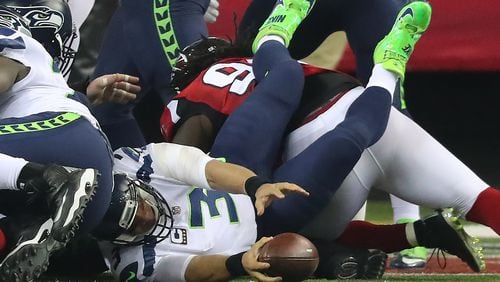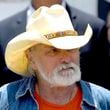Falcons quarterback Matt Ryan is now 2-4 in the playoffs and the sky, or shall we say the Super Bowl, is clearly the limit.
After three seasons away from the postseason, Ryan had some extra pressure to carry his team deeper, and he handled it with ease, leading the Falcons to a 36-20 victory over Seattle before a raucous crowd of 71,155 fans at the Georgia Dome on Saturday.
“That Dome was rocking,” Ryan said.
Falcons coach Dan Quinn asked the fans to arrive early and be loud. The festive white-towel waving bunch delivered.
With the win, the Falcons advance the the NFC Championship game for the fourth team in franchise history. The 1998 team was the lone one to reach the Super Bowl. The 2004 team led by Michael Vick was beaten by the Eagles, and Ryan’s 2012 team was defeated by the San Francisco 49ers.
Here are the five things that changed the outcome of the game:
1. Matty Ice the surgeon. The week off didn't hurt Ryan's pinpoint precision as he completed 26 of 37 passes for 338 yards and three touchdowns. He finished with a passer rating of 125.7.
“For Matt, we had certain plays that we liked,” Quinn said. “I thought the offensive line gave him time. We knew that was going to be a factor.”
With the solid protection, the leading MVP candidate was able to cut up the middle of Seattle’s defenses.
“I think we went where we should with the ball,” Ryan said. “When they played zone coverage and dropped their guys deep, we checked down and our running backs did a good job of getting as many yards as they could in those situations.
“When they went man-to-man coverage, I give our running backs, tight ends and wide receivers a lot of credit because they beat some really good corners and tough guys to go against in man-to-man coverage.”
With Seattle was trying to take away the Falcons’ chunk plays, Ryan was content to grind it out.
2. The running backs shined. The Falcons had to run the ball better against the Seahawks, who held them to 52 yards rushing in their regular-season matchup.
“Having the balance for us (was) key,” Quinn said. “Where we are able to run, have play-action, we can get plays off of that.”
On second-and-3 from the 13 on the Falcons’ first possession, Ryan tossed the ball to Tevin Coleman, and he raced outside for a 6-yard gain. From that play, the Falcons were able to build momentum in the running game.
In the key drive to start the third quarter, the Falcons ran with some authority against Seattle’s stout defensive front. Pro Bowler Devonta Freeman and Coleman combined to rush eight times for 44 yards. Freeman scored on a 1-yard touchdown run.
3. Pick and roll. Hawks coach Mike Budenholzer would have loved the pick-and-roll play between wide receiver Mohamed Sanu and Julio Jones that led to the Falcons' first touchdown.
Jones caught a 7-yard pass from Ryan after cutting behind Sanu, who reached out to block Seahawks cornerback Jeremy Lane.
Fox NFL rules analyst Mike Pereira said during the telecast that Sanu should have been penalized for pass interference on the play. Pereira is a former NFL vice president of officiating.
According to an NFL summary of rules, pass interference is “any act by a player more than one yard beyond the line of scrimmage significantly hinders an eligible player’s opportunity to catch the ball.” One of the “prohibited acts” specifically mentioned by the rules is: “Cutting off the path of an opponent by making contact with him, without playing the ball.”
Well, perhaps this was a makeup for the non-call on the pass interference at the end of the game in Seattle.
“I just saw it as a touchdown,” Sanu said. “I ran off the ball and Julio ran underneath me.”
4. Why teams defer. Why did the Falcons defer after winning the coin toss? They won the toss and instead of putting the league's top offense on the field they put their slow-starting defense out there.
It was no surprise that Seattle drove 89 yards on 14 plays to score a touchdown. Wilson tossed a 7-yard pass to Jimmy Graham for the touchdown.
The Falcons’ led the NFL in scoring, with 540 points. About the only way to stop them is to keep them off the field.
The Seahawks took 8:44 seconds off the clock.
The Falcons defense had problems starting games all season. Before getting a stop against the Rams, they gave up touchdowns on the opening drive of six consecutive games against the Chargers, Packers, Bucs, Eagles, Cardinals and Chiefs during the regular season.
But with a 19-10 lead, the Falcons got the ball to open the third quarter and scored to take control.
5. Central Intelligence Agency. The Falcons were not shy about putting a spy on Seattle quarterback Russell Wilson.
Defensive end Brooks Reed, defensive tackle Jonathan Babineaux, linebacker De’Vondre Campbell, safety Keanu Neal and linebacker Vic Beasley Jr. were all used to spy the elusive Wilson.
Despite the extra attention, Wilson was able to scramble away six times for 49 yards. But the spies helped the defense get three sacks, seven hits and 18 quarterback hurries.
“It certainly looked like we could have used a few more,” Quinn said. “He’s very difficult to keep in the pocket. When he gets outside whether it’s running to convert or creating time where he can throw it down the field, that’s where he’s has been most dangerous.”
All of the attention started to bother Wilson, who tossed fourth-quarter interceptions to free safety Ricardo Allen and linebacker Deion Jones.
“We knew we had to make him uncomfortable in the pocket,” Babineaux said. “We had him frustrated and running around. We were able to get some balls over thrown or thrown out of bounds for a stop or a snack.”
About the Author







